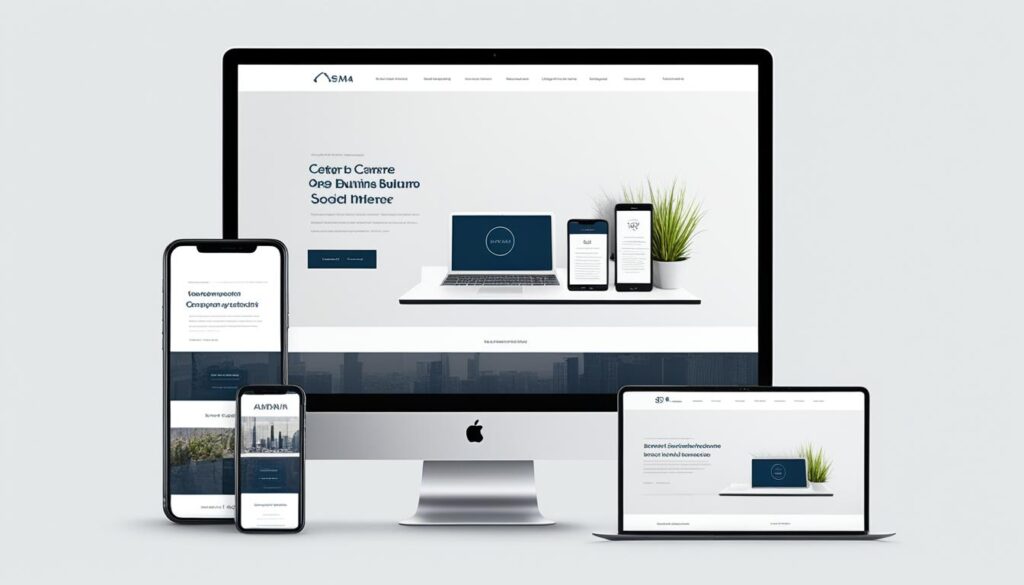Building a website for your business is a critical step towards establishing an online presence and reaching your target audience. Whether you’re new to website creation or looking to enhance your current online presence, our comprehensive guide will take you through the process of creating a professional and optimized website that drives business growth.
In this guide, we’ll cover everything from planning and designing your website to optimizing your content for search engines. Whether you’re a small business owner looking to boost your online presence or an established enterprise seeking to launch a new website, our expert tips and strategies will help you create a professional and engaging online presence that showcases your brand and drives business growth.
So let’s get started on how to build a website for a business with our comprehensive guide!
Planning Your Business Website
Effective planning is the key to successful website development; before starting, you need to define your website’s purpose, identify your target audience, and outline the key features and functionality. These tasks will help ensure your business website is a compelling and effective online presence.
To create a visually appealing and user-friendly website design for your business, you should pay attention to color schemes, layouts, typography, and navigation. This knowledge will create an engaging and intuitive user experience for your website visitors.
In addition to making your website visually stunning, you should also optimize your website’s content with relevant keywords. Doing so will help to drive organic traffic to your site and improve your online presence.
In short, effective website design for business is critical in establishing a strong online presence and reaching your target audience. Careful planning of your website’s purpose, features, and content will make building an effective website simpler and surer.
Choosing the Right Website Building Platform
When it comes to building a successful business website, choosing the right platform is crucial. Popular options such as WordPress, Wix, and Shopify offer a range of features, ease of use, and customization options to cater to different business needs.
Starting with WordPress, which is a popular website builder for its flexibility and open-source nature. With WordPress, you have full control over your website’s design, layout, and functionality, making it an excellent option for businesses that require customized websites. Additionally, WordPress offers a vast library of plugins and themes to add more features and functionality to your site.
Another popular website builder is Wix, which offers a user-friendly interface and simple drag-and-drop functionality. Businesses can quickly build and launch their website without any coding or web development experience. Wix also provides a vast array of templates to choose from, allowing users to customize their website design according to their needs.
If you’re looking to start an eCommerce business, then Shopify is an excellent option. With features specifically designed for online stores, such as payment gateways, inventory management, and marketing tools, Shopify streamlines the process of building an online store. Additionally, Shopify offers a range of attractive templates to help businesses create a visually appealing and engaging eCommerce website.
Ultimately, choosing the right website building platform comes down to finding the right fit for your business needs. Consider factors such as ease of use, features, cost, and customization options when evaluating different platforms.
Designing Your Business Website
One of the most crucial steps in building a successful business website is designing a visually appealing and user-friendly layout. A well-executed design can help to establish credibility, showcase your brand’s personality, and provide an engaging and intuitive experience for your users.
The Key Design Principles
When designing your business website, it’s important to keep key design principles in mind. These include:
- Color Schemes: Choose a color palette that aligns with your brand’s personality and evokes the desired emotions from your visitors.
- Layouts: An effective layout will make navigation intuitive and provide a natural flow for your site. Use white space effectively to establish visual hierarchy and draw the user’s attention to important elements.
- Typography: Font choices can either make or break your website’s design. Ensure that the fonts you choose are easy to read and align with your brand’s aesthetic.
- Navigation: Focusing on user experience is key in website design. Ensure your navigation is intuitive, clear, and easy to use to help keep visitors on your site.
Image Optimization
Optimizing images for your business website helps to improve page speed, website responsiveness, and overall user experience. Make sure to compress images to reduce file sizes, use responsive design to optimize images for different devices, and always include alt tags to improve image search visibility.
By following these design principles and optimizing your website for images, you can create a professional and visually pleasing online presence for your business.
Building and Optimizing Website Content
Once you’ve designed and structured your business website, it’s time to focus on creating quality content that engages visitors and drives conversions. Here are some essential tips for building and optimizing your website content:
Create Compelling Copy
Your website copy is the voice of your business, so it should be clear, concise, and compelling. Use descriptive language to highlight your product or service’s unique features and benefits, and craft a strong call-to-action that encourages visitors to take action. Make sure your content is scannable and easy to read, with short paragraphs, subheadings, and bullet points.
Optimize for Search Engines
Search engine optimization (SEO) is critical to ensure your website appears on the first page of search engine results pages. Incorporate relevant keywords throughout your content, including in your headings, meta descriptions, image alt tags, and URL structure. Aim to create high-quality, original content that provides value to your visitors, and avoid keyword stuffing or other black hat SEO tactics that could hurt your ranking.
Integrate Relevant Keywords
Identify and integrate relevant keywords into your website content to increase its visibility in search engine results pages. Use a mix of short-tail and long-tail keywords, and consider incorporating location-based keywords if your business operates in a specific geographical area. Use keyword research tools to identify high-volume, low-competition keywords that will help your content rank more highly in search results.
Conclusion
Creating a website for your business can be a daunting task, but with the right guidance, you can establish a professional online presence that drives growth. By following the step-by-step guide we’ve provided, you’ll be equipped with the knowledge and tools necessary to plan, design, and optimize your website effectively.
Remember, a successful website is one that not only looks great but also provides valuable information to your audience while remaining easy to navigate. Ensure your website has engaging content that is optimized for search engines to drive organic traffic to your site.
Don’t forget that your website is a reflection of your brand, and it’s crucial to maintain and update it regularly to keep up with changing market trends and customer needs. With dedication and hard work, your business website can be a valuable asset for growth and success.
FAQ
How can I build a website for my business?
Building a website for your business involves several steps. These include planning your website, choosing the right website building platform, designing the website, and optimizing the content. Following these steps will help you create a professional online presence for your business.
Why is it important for my business to have a website?
Having a website for your business is crucial in today’s digital age. It helps establish your online presence, provides valuable information about your products or services, allows customers to contact you easily, and enables you to reach a wider audience. It also enhances your credibility and helps you stay competitive in the market.
Which website building platform should I choose?
The choice of website building platform depends on your specific needs and preferences. Popular options include WordPress, Wix, and Shopify. Consider factors such as ease of use, customization options, and available features before making a decision.
What are the key design principles for a business website?
Designing your business website involves considering elements such as color schemes, layouts, typography, and navigation. It’s important to create a visually appealing and user-friendly interface that enhances the user experience and reflects the personality of your brand.
How can I optimize my business website for search engines?
To optimize your website for search engines, focus on creating high-quality and relevant content. Ensure your website includes keywords relevant to your business, optimize meta tags and descriptions, utilize SEO-friendly URLs, and improve the loading speed of your site. Additionally, consider implementing backlink strategies and using social media platforms to drive traffic to your website.
Let us build your website for you LEARN MORE










